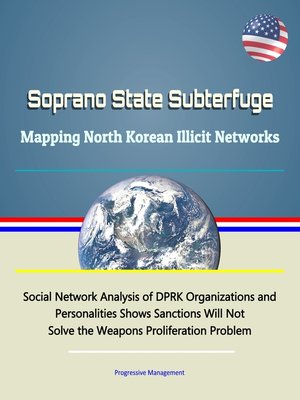Soprano State Subterfuge
ebook ∣ Mapping North Korean Illicit Networks--Social Network Analysis of DPRK Organizations and Personalities Shows Sanctions Will Not Solve the Weapons Proliferation Problem

Sign up to save your library
With an OverDrive account, you can save your favorite libraries for at-a-glance information about availability. Find out more about OverDrive accounts.
Find this title in Libby, the library reading app by OverDrive.



Search for a digital library with this title
Title found at these libraries:
| Library Name | Distance |
|---|---|
| Loading... |
This late 2018 report has been professionally converted for accurate flowing-text e-book format reproduction. This study researches the United States' approach to the illicit networks in the Democratic People's Republic of Korea (DPRK) and, using social network analysis, illuminates characteristics of several networks, thereby providing the U.S. government with options to exert influence over the DPRK regime. As the situation on the Korean Peninsula continues to evolve, it is paramount to look for new approaches that support a peaceful diplomatic resolution or create an advantage over current conditions in anticipation of potential future conflict. The study employs social network analysis of DPRK illicit organizations, networks, and personalities to demonstrate the depth and complexity of the DPRK regime. It shows that while sanctions and international efforts have eroded diplomatic ties in some areas and slowed the regime's weapons proliferation program and its economic sustainment, the sanctions and other efforts have not solved—and will not solve—the problem. Status-quo tactics and penalties are only temporarily and marginally delaying the DPRK's progress in advancing the nuclear weapons and ballistic missile technology. Thus, the United States needs to prepare additional options to preserve its national interests.
This compilation includes a reproduction of the 2019 Worldwide Threat Assessment of the U.S. Intelligence Community.
I. Introduction and Background * A. The Problem and its Significance * B. Purpose and Scope * C. Literature Review and Theoretical Framework * D. Methodology * E. Road Map * II. Open-Source Data-Analysis Case Study * A. Centralized * B. Limited * C. Vulnerable * D. Key Takeaways * III. Using Social Network Analysis To Illuminate Dark Networks * A. Dataset Description and Framework * 1. Relational Definitions * 2. Relational Attributes * B. The DPRK Regime's Resourcing Network * 1. Ship-to-Organization Network * 2. Representative-to-Organization Network * 3. Organization-to-Organization Network * 4. Aggregate DPRK Regime Network * 5. Network Comparisons * 6. Network Conclusions * C. Conclusion * IV. Conclusion
This study uses a database of sanctioned entities identified by the UN and the U.S. Department of the Treasury, focusing on maritime vessels, front companies, and illicit activities that include weapons trafficking and foreign labor. By comparing shipping entities to other maritime databases (e.g., the Asia-Pacific Port State Control), we mapped locational data to highlight ports of interest, routes, and potential associations with other companies and subsidiaries. The study uses data from the UN Security Council and UN Panel of Experts to analyze the network characteristics of regime-controlled people and companies, in addition to proxies and witting and unwitting business entities that facilitate regime activities.







